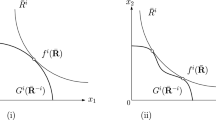Summary
Consider a solution (an allocation rule) for an economy which satisfies the following criteria: (1) Pareto efficiency, (2) monotonicity, in the sense that if the set of attainable allocations of the economy becomes larger then the solution makes no consumer worse-off, (3) a weak and primitive notion of fairness with respect to some commodity, say commodityh, in the sense that in an exchange economy in which the aggregate endowment consists only of commodityh, the solution is equal division. We show that in the class of economies which includes non-convex technologies the only such solution is egalitarian equivalence with respect to commodityh. It is also shown that this characterization of egalitarian equivalence holds in convex exchange economies if we add a weak version of a positive association requirement.
Similar content being viewed by others
References
Alkan, A., Demange, G., Gale, D.: Fair allocation of indivisible goods and criteria of justice. Econometrica59, 1023–1039 (1991)
Chun, Y., Thomson, W.: Monotonicity of bargaining solutions when applied to economics. Math. Soc. Sci.15, 11–27 (1988)
Foley, D.: Resource allocation and the public sector. Yale Econ. Ess.7, 45–98 (1967)
Hurwicz, L.: On allocations attainable through Nash Equilibria. In: Aggregation and revelation of preferences. Laffont, J. (ed.) Amsterdam: North-Holland 1979
Kalai, E.: Proportional solutions to bargaining situations: interpersonal utility comparisons. Econometrica45, 1623–1630 (1977)
Maskin, E.: Nash equilibrium and welfare optimality. Mimeo 1977
Moulin, H.: Egalitarian equivalent cost-sharing of a public good. Econometrica55, 963–977 (1987a)
Moulin, H.: A core selection for pricing a multi-output monopoly. Rand J. Econ.18, 397–407 (1987b)
Moulin, H.: Monotonic surplus sharing: characterization results. Games Econ. Behav.1, 250–274 (1989)
Moulin, H., Thomson, W.: Can everyone benefit from growth? Two Difficulties. J. Math. Econ.17, 339–345 (1988)
Pazner, E., Schmeidler, D.: Egalitarian equivalent allocations: a new concept of economic equity. Quart. J. Econ.92, 671–687 (1978)
Roemer, J.: The mismarriage of bargaining theory and distributive justice. Ethics,97, 88–110 (1986)
Tadenuma, K., Thomson, W.: The fair allocation of an indivisible good when monetary compensations are possible. University of Rochester, 1989 Working Paper No. 257. Revised 1990
Thomson, W.: Comment on L Hurwicz: On allocations attainable through Nash equilibria. In: Aggregation and revelation of preferences, J. Laffont, (ed.) Amsterdam: North-Holland 1979
Thomson, W.: Monotonic allocation rules. Mimeo, University of Rochester 1987. Revised 1990
Vohra, R.: Equity and efficiency in non-convex economies. Soc. Choice Welfare9, 185–202 (1992)
Author information
Authors and Affiliations
Additional information
We are grateful to William Thomson and three anonymous referees for extensive comments on an earlier version. We also acknowledge helpful comments of the participants of the Social Choice and Welfare Conference held in Caen, June 1992.
Rights and permissions
About this article
Cite this article
Dutta, B., Vohra, R. A characterization of egalitarian equivalence. Econ Theory 3, 465–479 (1993). https://doi.org/10.1007/BF01209697
Received:
Revised:
Issue Date:
DOI: https://doi.org/10.1007/BF01209697




